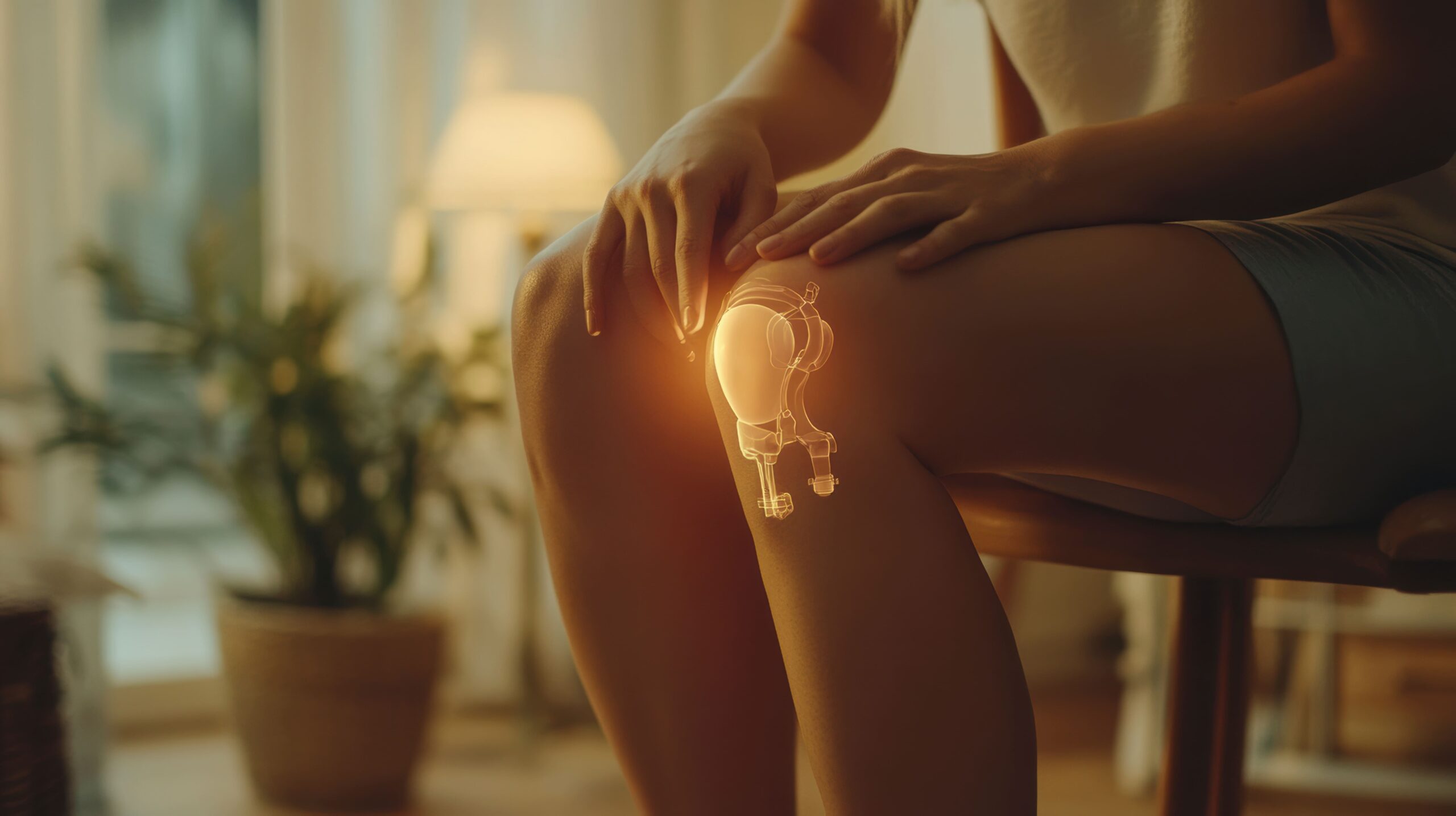Nighttime pain after knee prosthesis surgery is common due to the healing process and reduced nighttime activity. This discomfort can be alleviated with medication, ice applications and consulting a physical therapist.
The implantation of a knee prosthesis, also known as knee arthroplasty, is a widely used surgical procedure to treat patients with severe knee joint problems.
This procedure replaces the damaged joint surface with an artificial prosthesis to restore functionality and relieve pain. Despite the significant benefits of knee prosthesis implantation, some patients may experience temporary nighttime pain after the surgery. This phenomenon can cause concern and affect sleep quality and overall well-being. Therefore it is crucial to understand the underlying causes and properly address this postoperative nighttime pain.
Let’s explore why knee pain occurs at night and how to remedy it.
Index
- Why do you experience knee pain at night?
- Relieving nighttime pain caused by knee prosthesis implantation
- FAQ
Why do you experience knee pain at night?
Experiencing knee pain, even acute pain, after surgery is normal. The surgical procedure can trigger an inflammatory response as part of the healing process. The patient may experience swelling, tenderness and pain, which can be more pronounced during nighttime rest.
During the day we are often engaged in activities that can distract us from the pain, such as working or moving around. At night, however, we are more aware of physical sensations, including pain. Additionally, muscle activity around the knee decreases as we rest, leading to less joint stability and a reduced ability to absorb stress, increasing perceived pain.
It’s important to remember that inflammation is a normal aspect of the initial recovery phase, but excessive inflammation can cause significant pain, and you should contact your trusted orthopedic specialist as soon as possible.
Another factor that can cause nighttime knee pain is incorrect prosthesis positioning. Accurate prosthesis placement is essential to ensure proper weight distribution and smooth joint movement without causing friction or tension.
Finally, nighttime movements can cause greater irritation between the prosthesis and tissues, leading to pain. Adequate postoperative rehabilitation, including stretching and muscle-strengthening exercises, can help reduce tissue irritation and thus any discomfort.
Relieving nighttime pain caused by knee prosthesis implantation
Even though some pain is normal after knee surgery, it doesn’t mean the patient has to suffer excessively or for a long time. There are several measures that can be taken to relieve knee pain.
First and foremost it is important to follow the instructions of the orthopedic surgeon and medical staff to avoid errors that could compromise the success of the surgery.
A common method to reduce nighttime pain is to use analgesic medications prescribed by a doctor, such as opioids or non-steroidal anti-inflammatory drugs (NSAIDs). These can help reduce inflammation and swelling, providing more restful nights.
Applying ice to the knee can also be useful for reducing pain and inflammation. Care must be taken not to place the ice directly on the skin to avoid cold damage.
Lastly, physical therapy can play a crucial role in reducing nighttime pain.
An experienced physical therapist can prescribe specific exercises to strengthen the muscles surrounding the knee and improve stability. A professional can also teach the patient manual therapy techniques such as massage, to relieve muscle tension and promote healing.
Nighttime pain after total knee replacement typically appears about 20 days after surgery and tends to resolve spontaneously within a month and a half. It is part of the healing process.
Watch the humidity
Sleeping in a dry and healthy environment can help prevent nighttime knee pain after surgery. This attention helps maintain proper skin temperature and reduce humidity. Humidity can promote the proliferation of microbes and infections, which could compromise the healing of the operated knee and increase nighttime pain.
During sleep important tissue repair processes occur, including protein synthesis, collagen production and the restoration of energy reserves.
A suitable environment promotes quality sleep, allowing healing and recovery processes to occur optimally.
Don’t suffer further: if you experience severe knee pain due to recent surgery and feel something is wrong, don’t wait and contact me immediately.
I am Dr. Vanni Strigelli, an orthopedic surgeon in Florence, specializing in knee and foot prosthetics. Thanks to my experience and skills you can regain the pleasure of sleeping and facing your days without pain.
FAQ
Why do you experience pain after knee prosthesis surgery?
After knee prosthesis surgery it is common to experience pain due to the healing process and the body’s adjustment to the new prosthesis. During surgery the damaged part of the knee is removed and an artificial prosthesis is implanted. This can cause inflammation, swelling and irritation of the surrounding tissues, leading to pain.
Why do you feel more pain at night?
Increased pain at night after knee prosthesis implantation can occur for several reasons.
At night physical activity is reduced and the knee position can increase pressure and stress on the joint. Additionally, the body naturally produces fewer endorphins at night, which are chemicals that help reduce pain and improve mood.
How to relieve nighttime pain after knee prosthesis implantation?
To relieve nighttime pain after knee prosthesis implantation several strategies can be helpful. You can apply ice packs to the affected area before bedtime to reduce inflammation. Additionally, follow the doctor’s instructions regarding the use of prescribed pain medications. Finally, avoid sudden movements or excessive stress on the knee during the night. If the pain persists or worsens, it is important to consult the doctor to evaluate potential complications or adjust the pain management plan.


